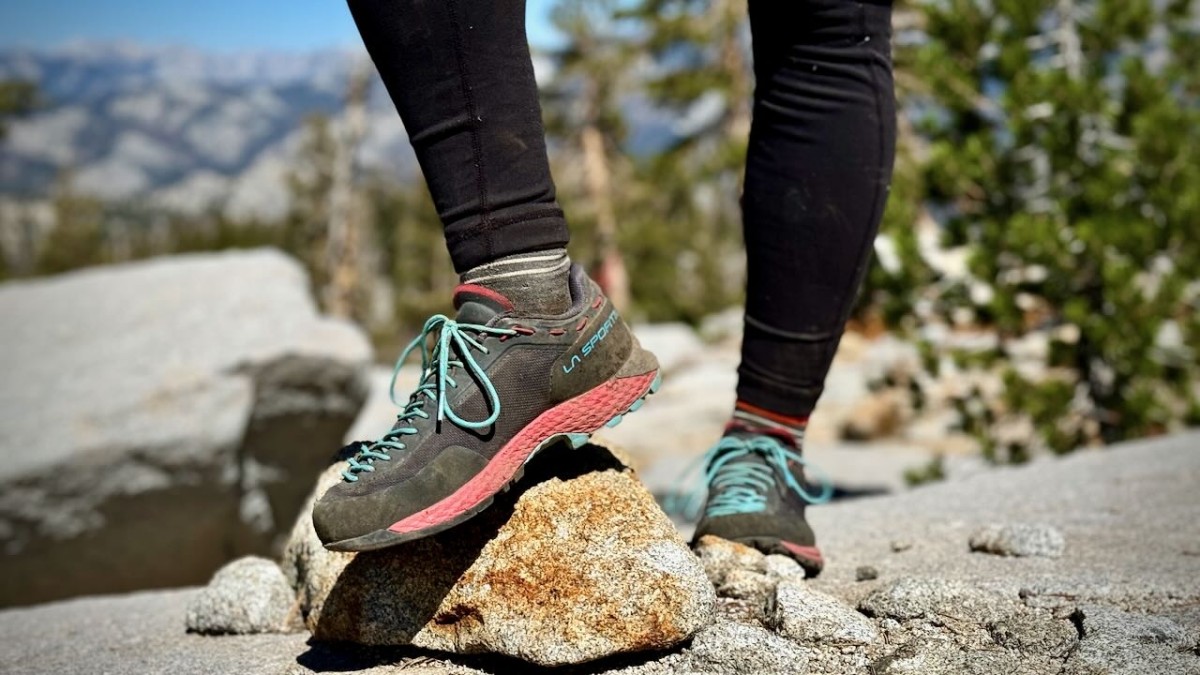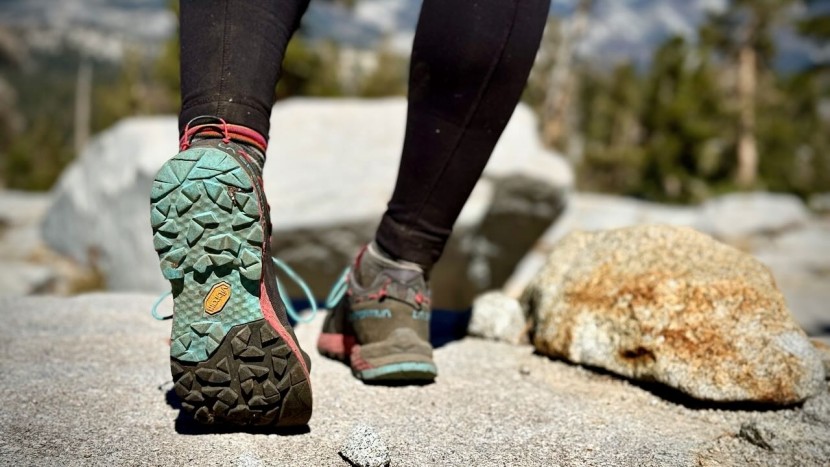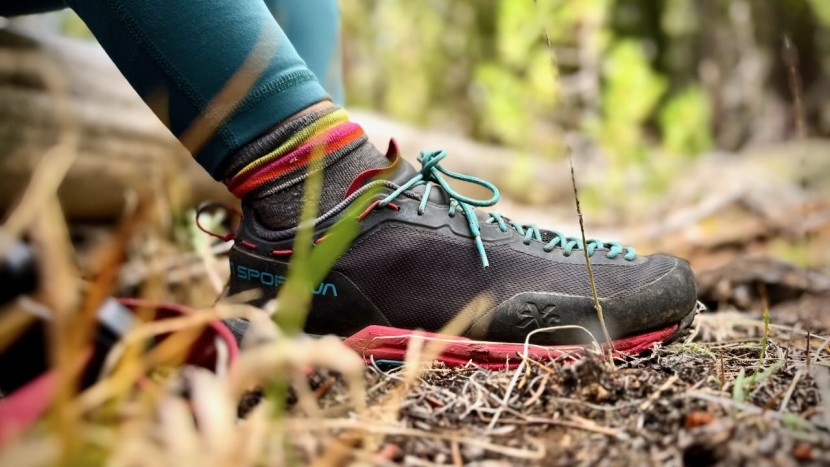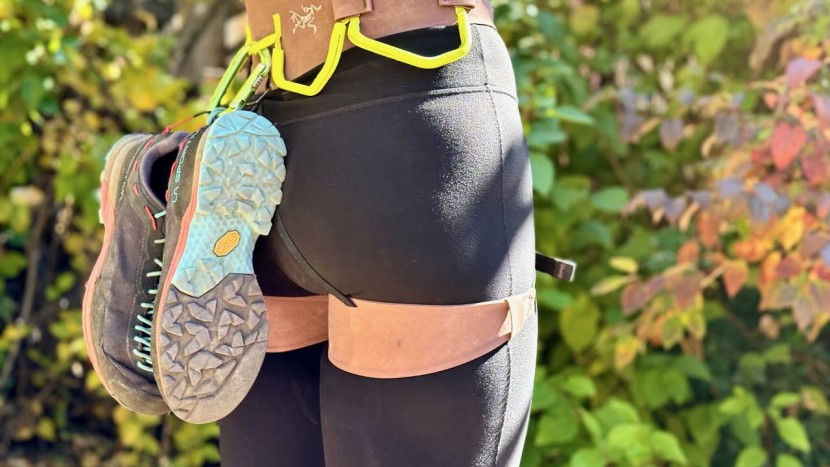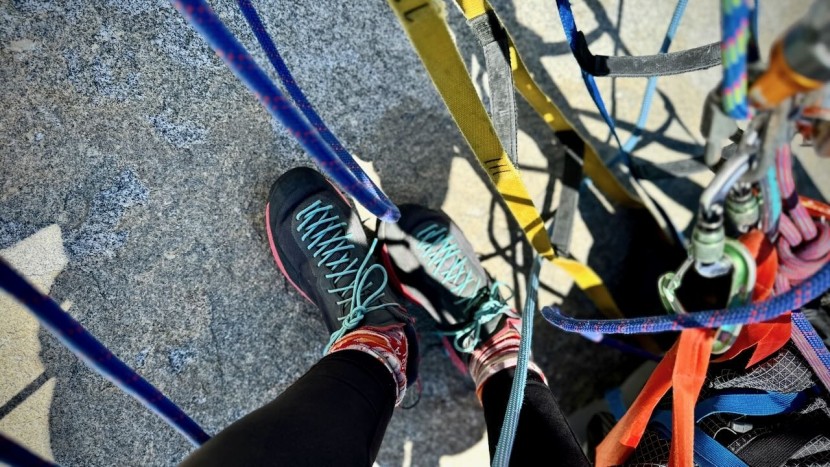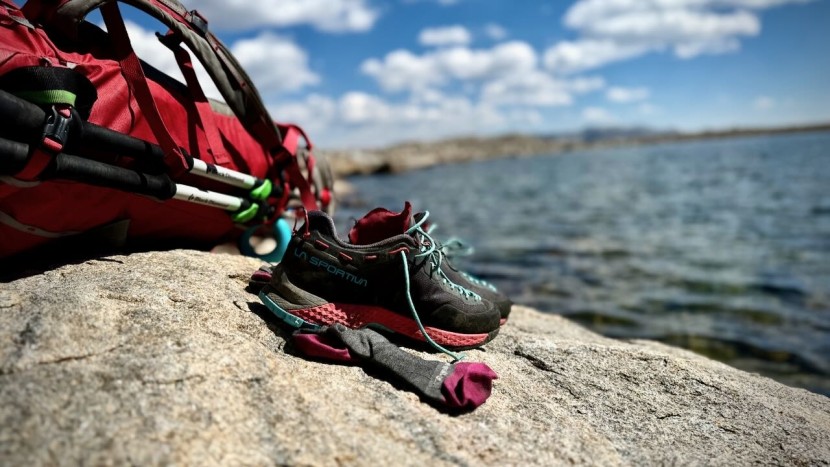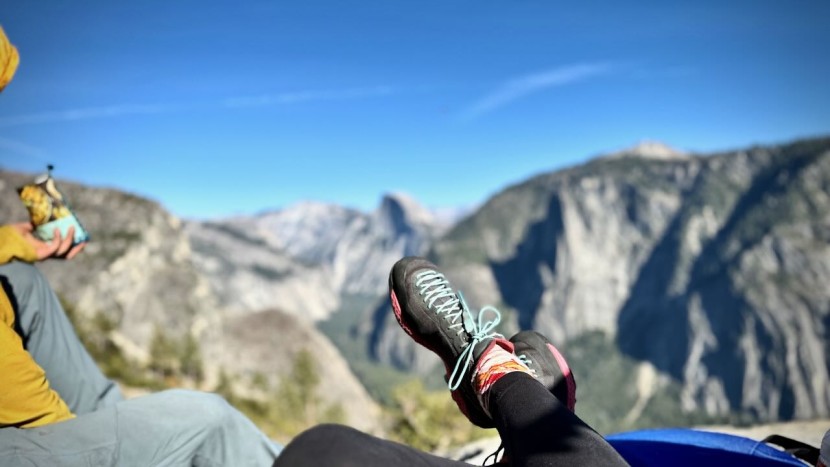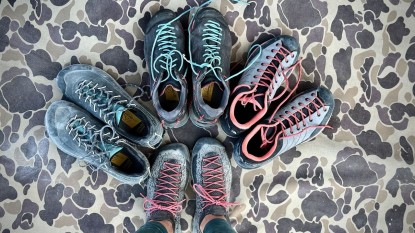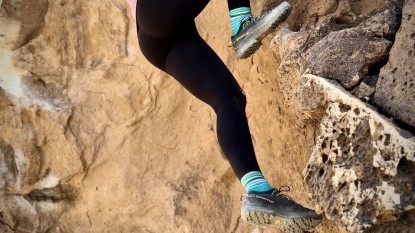Our Verdict
Compare to Similar Products
 This Product
La Sportiva TX Guide - Women's | |||||
|---|---|---|---|---|---|
| Awards | Best for Alpine Climbing | Best Overall Women's Approach Shoe | Best for Everyday Wear | Best Bang for the Buck | Highest Quality Construction |
| Price | $144.35 at Amazon Compare at 2 sellers | $44.70 at Backcountry Compare at 3 sellers | $169.00 at REI Compare at 3 sellers | $149.00 at REI Compare at 3 sellers | $219 List |
Overall Score  |
|||||
| Star Rating | |||||
| Bottom Line | A solid shoe that excels in climbing ability and overall durability, but is not our first recommendation for comfort | Thanks to its lightweight design, comfortable build, and top-notch climbing ability, this shoe is an all-around favorite of our testing team | Although one of the heavier designs that we tested, these shoes provide support and stability for everything from long approaches to big walls | An awesome budget option that covers the needs of most climbers and is especially equipped for hiking comfort and long-term durability | A well-constructed approach shoe with a durable design that was built for alpine terrain |
| Rating Categories | La Sportiva TX Guid... | La Sportiva TX2 Evo... | La Sportiva TX4 Evo... | La Sportiva Boulder... | Scarpa Mescalito Pl... |
| Climbing Ability (30%) | |||||
| Hiking Comfort (25%) | |||||
| Weight and Packability (20%) | |||||
| Support (15%) | |||||
| Construction Quality (10%) | |||||
| Specifications | La Sportiva TX Guid... | La Sportiva TX2 Evo... | La Sportiva TX4 Evo... | La Sportiva Boulder... | Scarpa Mescalito Pl... |
| Measured Weight (per pair) | 21.0 oz | 18.7 oz | 24 oz | 28.9 oz | 21.4 oz |
| Sole Rubber | Vibram Mega-Grip and IdroGrip | Vibram Idrogrip | Vibram Megagrip rubber with Impact Brake System, Climbing Zone Platform and 4 mm lugs | Vibram Idro-Grip V-Smear | Vibram Dynamis LB and Megagrip |
| Width Options | Regular | Regular | Regular | Regular | Regular |
| Upper | Ultra-weave jacquard textile;thermoplastic polyurethane reinforcements | Recycled knit; toe and heel: polyurethane TechLite | Nubuck leather; cushioned tongue with recycled fabric; recycled rubber rand/toe cap; Mythos Lacing System with recycled laces/hooks | Leather | Prespair with 45% recycled yarns |
| Midsole | OrthoLite, dual-density compressed EVA, TPU Torsion Shank | Traverse lite injection MEMlex with co-molded TPU shank | Fabric forefoot wrap; Traverse Injection MEMlex with co-molded TPU shank and 7% recycled EVA; ESS Resole platform | Micropore EVA | Dual-density 45% recycled EVA |
Our Analysis and Test Results
Impressive climbing ability and a stiff midsole make the TX Guide great for burly mountain endeavors and big walls. That said, the fit is very narrow, making these shoes limiting for those with wider feet, we recommend trying these shoes on in person as it was necessary for our testers to size up a half size for a more precise fit.
Climbing Ability
What sets approach shoes apart from hiking shoes and makes them unique to climbers is their ability to handle well on technical terrain. Approach shoes feature a rubber similar to climbing shoes in their stickiness and they often sport a “climbing zone” at the front of the toes to increase smearing and edging capabilities on fourth and fifth-class rock. To test climbing ability, we climbed a variety of rock types. Slabs, cracks, and face holds are some of the styles of technical foot placements one may encounter when traveling in technical terrain. For us, a shoe used for alpine scrambling must inspire confidence. At times, your shoes are the key component for staying alive and attached to the mountain. This is why this metric is so important, especially when it comes to the TX Guide and its award-winning performance as our go-to for big missions.
There are a few key features that contribute to these shoes excelling in the climbing department. Like most La Sportiva approach shoes, the TX Guide has a Vibram MegaGrip outsole that is super sticky and confidence-inspiring in talus and on scramble-y approaches. Since these shoes are designed for guides and fast alpine travelers, the multi-directional tread is designed for maximum traction and climbing ability. The stiffness of the midsole makes standing on edges easy, while the narrow profile makes them ideal for precision foot placements. We also liked the asymmetrical lacing system, which allowed us to fine-tune the fit for scrambling. The reinforced rubber toe cap and the durable synthetic upper adds an extra layer of protection for the feet, which comes in handy in talus and when scrambling.
Hiking Comfort
As mentioned above, the TX Guide is a climbing performance machine. This shoe is designed for moving fast in the alpine and covering ground confidently and efficiently. This is precisely why we selected this shoe for an off-trail high traverse of the Wind River Range during our summer testing period. Their stiff soles, narrow profile, and sticky rubber make them great climbing shoes, but this also means that they sacrifice some comfort. Although less padded than other approach shoes availavble, our testers found they the shoe provided just enough padding for carrying heavy loads or covering a lot of ground in a single day.
The stiffness and narrow fit of the toe box that makes the TX Guide a precision climbing machine also creates the potential for foot pain on long slogs into the mountains. Depending on your foot shape and the overall fit of the shoe, this can be either a major issue or inconsequential. The inspiration behind this shoe is light and fast movement through technical terrain over comfort, so it makes sense that the TX Guides have more features that emphasize climbing ability over comfort and padding.
Weight and Packability
Weight is an important aspect of approach shoes. On the trail, heavier shoes make for tired legs over long distances. Clipped to a harness or stuffed into a climbing pack, less weight and a streamlined profile help keep approach shoes out of the way and less of a distraction. Packability varies a bit more and depends on the shape and size of the shoe. Some shoes are light on the scale but have a profile that makes them difficult to pack down into a daypack.
The TX Guide falls in the middle of the pack on the scale, with a measured weight of 21.44 ounces for a size 39.5, as measured on our scale. For the level of support and stiffness these shoes provide, 21.44 ounces seems fairly lightweight. In terms of packability, their narrow profile makes them feel small and compact when clipped to a harness or when shoved into a pack.
Support
Padding and cushioning help shoes feel comfortable from the first step onward. As the miles add up, the support a shoe provides begins to affect comfort. When moving across rocky terrain, a stiffer sole actually provides support that protects the feet from getting sore. A more flexible shoe tends to wear out feet faster.
Unlike some of the approach shoes in this review, the TX Guide has the stiffness and construction to hold up to major abuse on the trail. These shoes are solid workhorses that will support your feet when carrying heavy loads or when standing in ladders. We've hiked deep into the backcountry in these shoes and have also done a fair bit of big wall climbing in them and have yet to complain about the lack of support underfoot. If anything, the stiffness of the shoe can feel a bit unforgiving after miles on the trail.
Footbeds
Our lead tester has always had trouble with foot pain, though she hikes hundreds and hundreds of miles in approach shoes every year. To combat the lack of support often found in approach shoes, she uses Superfeet insoles (one of the best insoles, in our opinion) to add a bit more arch support underfoot. This can help with the generally flat and unsupportive insole that comes in most approach shoes.
Construction Quality
The TX Guides are one of La Sportiva's most well-constructed shoes. They held up extremely well to over a year of repeated use hiking in the mountains and scrambling low 5th-class terrain. The extra thought to the details of this shoe is what sets the TX Guides apart from others and, in our opinion, contributes to the long life of these shoes.
For instance, the ultra-weave jacquard upper is durable and resistant to repeated abrasion, and the PU-Tech lite heel and toe caps protect the front and rear of the shoe from jamming into cracks. Besides some minor delaminating on the heel of the shoe after an extensive off-trail alpine traverse, we haven't noticed any abnormal wear and tear on these approach shoes. Whether big walling, hiking for miles in technical alpine terrain, or simply approaching the base of a rock climb, we think the TX Guides are well worth the investment.
Should You Buy the La Sportiva TX Guide?
The TX Guide shoes are made for scrambling and traveling over mountainous terrain. They are burly enough to handle the wear and tear of big wall climbing and moving through talus fields. Their solid construction, breathable yet durable upper, and super stiff midsole make these our go-to for big missions – whether long alpine scrambles or big walls in Yosemite Valley. The stiffness provided by the midsole is crucial for both feeling solid on rock and for standing in ladders and performing the work of wall climbing. These lightweight and sleek shoes are up to any burly task – but fall a bit short in terms of comfort. That said, their narrow shape caters to climbers with a narrower toe box.
What Other Approach Shoes Should You Consider?
The TX Guide is on the more expensive end of the spectrum and specially designed to excel in a mountain environment. If you're looking for a more all-around shoe, the La Sportiva TX4 Evo is a great option. Its scores were high across the board, and the shoe features a wider fit that is more comfortable for everyday wear. The La Sportiva TX2 Evo is also an excellent shoe and was our favorite of the testing fleet. It climbs even better than the TX Guide and is definitely more comfortable, however, its mesh uppers lack the support, durability, and protection of the TX Guide.


